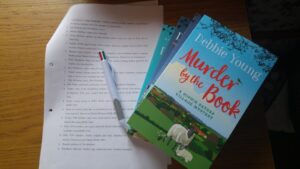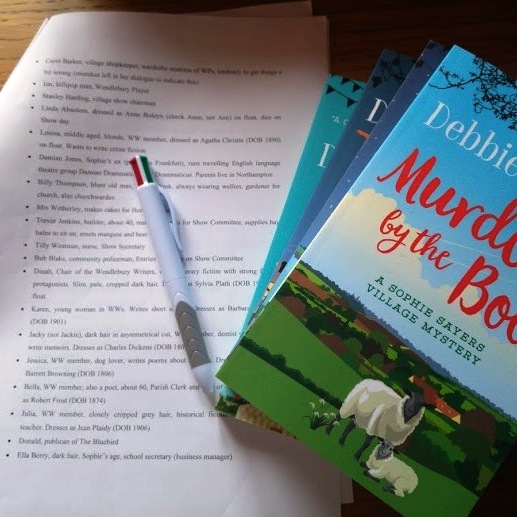
ALLi Author Advice Center Editor Debbie Young
Do you have trouble keeping track of information about your characters, settings and other crucial details when writing a book? Can't remember whether Sally's eyes where blue or green when you first introduced her? Just realised that Harry had grown two inches taller between books 1 and 2, even though he was already an adult when readers met him?
If you're self-publishing a series, the task of assuring continuity becomes even more daunting, with a growing cast of people and places – and a growing number of eagle-eyed readers who will spot inconsistencies from one book to the next who may even take delight in pointing out your errors in their reviews!
Some authors find it relatively easy to keep notes as they go along, creating files for every character and religiously recording every new detail as it emerges. The writing software Scrivener includes useful sections for such notes, but you can use any system that suits you, including paper files.
But many authors simply don't think or operate that way, especially if they're more of a pantser than a plotter. Mea culpa! (If you don't know which you are, read the post mentioned at the end of this article.)
And even authors who have logical minds in other areas, when writing a book, they can become so close to the text that it's hard for them to see the detail objectively and dispassionately, and to treat it in a matter-of-fact way. (Again, that's my experience!)
Style-sheets: One of the Many Superpowers of Editors

Keeping track of your characters needn't be murder if you've got a good style sheet to hand
This is where a good editor will morph into your superhero and come to your rescue with a style-sheet, as I've experienced at first hand when working with my own editor Alison Jack, one of many tried-and-trusted editors who qualify as ALLi Partner members. (See our Partner Directory for a full list – and if you've paid to join ALLi, you'll find that many of them also offer a substantial discount for ALLi members.)
The meticulous mind-set and attention to detail typical of good editors fits them very well for creating a clear and easy-to-follow style-sheet that you will find an indispensable source of reference. Although you wrote the book, if you're like me, your editor is likely to do a better job of the style-sheet than you would yourself!
From the Editors' Perspective
Professional editor Richard Bradburn of www.editorial.ie advises:
“A thorough editor will produce a style-sheet for you, listing all the main characters and their particular stylistic or physical quirks, for example, to ensure continuity throughout the series. That way, not only can you keep track of factual information in a single book, but also subsequent books in a series can be checked against the earlier books. Any new characters (or locations) introduced in each book are added to the style-sheet for the series.”
It therefore makes sense when writing a series to use the same editor for every book, unless you're prepared to pay your latest editor to read the earlier books to compile the style-sheet. “The style-sheet is essential for consistency,” says Bernadette Kearns of www.booknannyfictioneditor.com. Of course, if you do have to switch editors, providing them with your style-sheet for the story so far will help them get up to speed with your work
An Alternative Work-Around
While using a professional editor's service is the ideal solution, if your budget doesn't run to outsourcing for a style-sheet, you might try a solution that worked for ALLi Author Maggie Lynch, provided you can muster a team of volunteers from your readership:
At about book four in a six-book series, I realized I hadn't been keeping good enough notes about my characters, I had all the main ones down, but then they started having babies, and I didn't track those, and later books had to mention them. So I paid one of my superfans (who had pointed out a couple of inconsistencies to me already) to do a series bible for me. She said she'd do it for free, but I gave her a $100 gift certificate to Amazon, which was her preference.
Ask the Editor!
If your editor isn't already providing this service, ask how much they'd charge to add it to what they already do for you. Bear in mind there are different types of editing, so it's important to be clear what services you need – and what you get for your money. And if you haven't yet chosen your editor, check out ALLi's Services Directory for a list of Partner Members who specialise in professional editing services.
If you're an ALLi member, they may even offer you a special discount.
And if you haven't yet joined ALLi to avail yourself of many more membership benefits, you can find out more about how and why to join here.
One of many ways in which a good #editor will help #indieauthors impose quality control on their #selfpub books: with the provision of a style-sheet for continuity - by @DebbieYoungBN Share on XOTHER WORTHWHILE READS ABOUT WRITING
From the ALLi Author Advice Center Archive





Thanks for sharing impressive short but summarized article on creating and style a book.
A very nice & informative article, Thanks and Keep sharing with us!
Wow, the style sheet reminds me of the character sheet, a piece of paper roleplaying games around the world from my generation knew only too well! 🙂 It sounds like something like this is a good thing to have to keep track of continuity! Thank you for sharing, Debbie!
I started a style sheet for the characters and place names, etc. in my FAB Club series. It isn’t that hard to do (for a chapter book) and is useful for editors and for writing sequels, when time has passed and you don’t remember all the fine detail.
It also showed me where I had some gaps in my character attributes, which I’m able to fill out further down the track.
This is a great blog post, thanks for sharing such an awesome article with us.
How I can find author who is interested to design book and he/she can’t herself.
Also I’m looking to have editing friends.
My e-mail:[email protected]
My website not updated because of copyright.
Thank you for your time and consideration
This can become very complicated if you work on a long series with many characters and want to get really serious about consistency and continuity. I did a nerdy article on what’s possible: https://hollowlands.com/2014/09/creating-a-book-series-bible-using-scrivener-scapple-and-aeon-timeline/?utm_source=ar&utm_medium=po-1
That was a couple of years ago… and I now think of it as overkill (the method works but it’s too much trouble). On the other hand, I find character sheets too simplistic — there’s a lot more to keep track of that just that. These days I have 2 critical related processes for story bible tracking:
1) An index of names/places — Full version for entire series which grows. For each individual book, I copy it, and delete the entries not used in that book. I keep it in Scrivener, and it’s published at the back of each series book.
2) A simple relational database (more flexible than a spreadsheet) for Books / Characters / Affiliations-in-the-bookworld / Other categories as required.
For example, in my current fantasy series, there are types of magic, types of guilds, different locations/countries/nationalities, different clans, etc…. Any one thing (a character, say) has not only a name, age, appearance, and behavioral quirks; he also is part of a family/place/guild/type of magic user/etc., each of which have their own characteristics and histories. (That’s why a relational database is more flexible than a spreadsheet). I’ve built these in various tools, but right now I’m enjoying an online system called Airtable (the free version does everything I need).